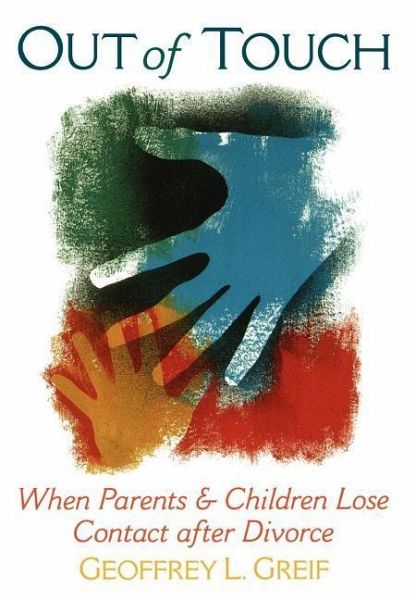
Out of Touch
When Parents & Children Lose Contact After Divorce

PAYBACK Punkte
20 °P sammeln!
Why do parents stop having contact with their children after separation and divorce? How does this falling out of touch affect them and their children, and what can noncustodial parents do to maintain contact? This book offers a perspective for parents who are "out of touch" by exploring what the loss of contact means in their lives as well as the lives of their children. It presents portraits of parents pushed away by the other parent or by their children after painful and emotional divorces. It also discusses the emotional, legal and public policy issues involved for divorced parents and their children.
Setting out to find the reality beneath the catchall categorization of out-of-touch parents as deadbeats, substance abusers, child mistreaters, or criminals, Greif focuses on those parents who tried and, for a vast array of reasons, failed to maintain contact with their children. It is their voices, in a discussion dominated up till now by the custodial parent, that we most need to hear, Greif argues, if we are to uncover ways to avoid such failures in the future. Rather than offering dry statistics and abstract generalizations, Greif lets us hear these voices directly in 26 in-depth interviews with estranged parents and with children caught in the crossfire of painful divorces. These interviews, and Greif's perceptive analyses of them, reveal the whole spectrum of logistical, emotional, and legal difficulties that keep parents and children apart. From the ordinary problems of visitation rights and child support to the more complex and troubling issues - bitter court battles, accusations of sexual abuse, domestic violence, children rejecting a parent, child kidnapping, and many others - Out of Touch vividly and often heart-breakingly presents all the ways that fathers and mothers, even with the best intentions, can lose contact with their children. But the book does more than tell the stories of failed relationships. Its concluding chapter offers a series of specific and extremely helpful suggestions for families - parents, children, grandparents - who find themselves in danger of complete estrangement. Greif outlines how families can employ support systems, communication skills, mediation, and many other strategies to overcome the most difficult obstacles that occur after a divorce. Itis here that the lessons gleaned from the broken relationships of the past become invaluable advice for the future.













